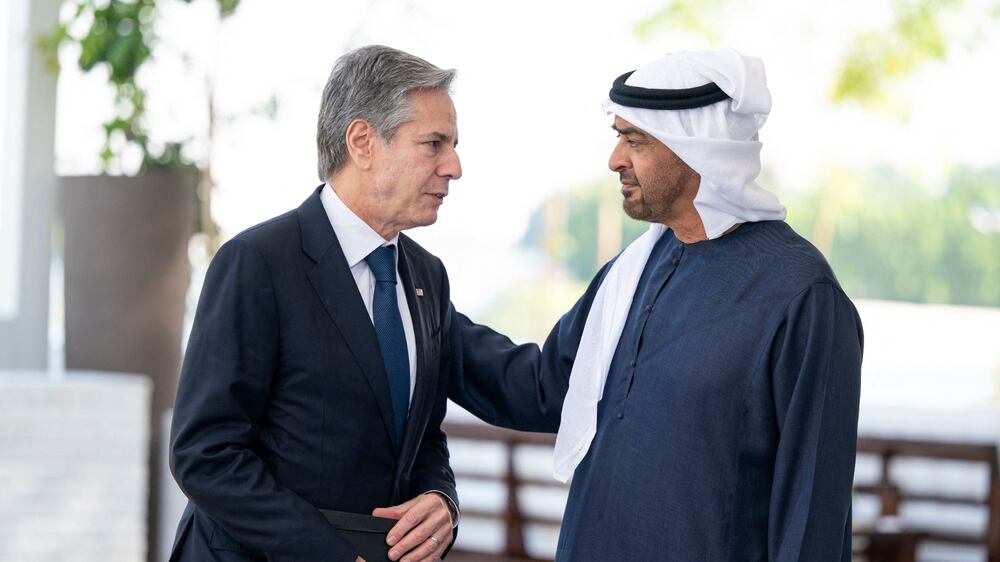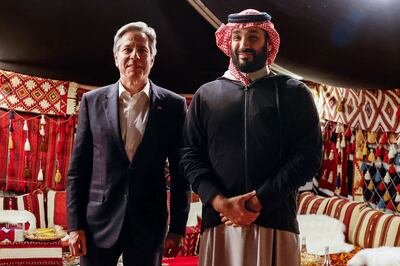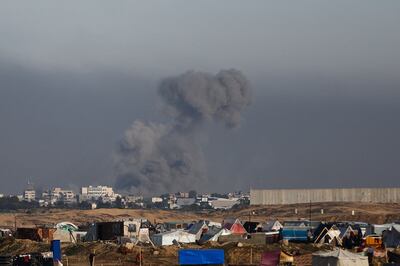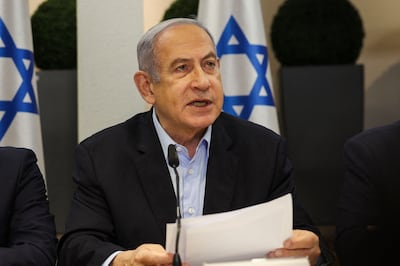Live updates: Follow the latest news on Israel-Gaza
US Secretary of State Antony Blinken is on his fourth visit to the region since the Gaza War as part of a week-long Middle East tour to avert a widening Middle East conflict.
Diplomatic sources told The National he is expected to raise pressure on Israel, which Washington wants to rein in amid growing Israeli air strikes on Hamas figures in Lebanon and Syria while listening to concerns of other US allies in the region.
Senior officials across the region have told The National about the urgent diplomacy Mr Blinken has been engaged in and the kind of conversations he has been having behind closed doors in Arab capitals.
The war in Gaza, which has killed more than 23,000 Palestinians, began with the worst attack in Israel's history and is gradually spreading to Lebanon, Yemen, Syria and Iraq.
Mr Blinken landed in Israel on Monday evening and will “tell Israel that the US doesn't want to see a bigger escalation”, a veteran Palestinian politician in Gaza said.
Core US interests, and those of the region such as protecting global shipping routes and averting a significant refugee crisis, are on the agenda, as well as reviving a shattered regional peace process.
As the war widens, the Iran-backed Houthi militia has pressured Red Sea transit routes, which account for about 12 per cent of global trade, with missile attacks and hijacking aimed at commercial shipping.
In Lebanon, Hezbollah, which has by some estimates three to five times the rocket arsenal of Hamas, is on the brink of war.
Mr Blinken will also say that “playing with fire that started with the assassination of [senior Hamas official Saleh Al Arouri] should stop, perhaps by agreeing first to a ceasefire in Gaza”.
Last week, Israel assassinated Al Arouri in a missile strike in Beirut, a move that was widely interpreted as a severe escalation in retaliatory fighting between Israel and Lebanon-based militant group and Hamas ally Hezbollah.
“The current week is decisive in terms of battles and the fear of the outbreak of a bigger regional war,” the Palestinian politician said.
“If a political solution is not reached, then the prospects for a regional war will keep increasing.”
The US is Israel’s most important ally, providing vast amounts of military aid and routinely shielding it from condemnation at the UN.
The Biden administration has come under international criticism for continuing such levels of support, even as Israel continues its campaign in Gaza, costing many thousands of civilian lives.
The war on Gaza, now in its fourth month, threatens to drag Israel’s regional enemies into a devastating war that stretches beyond Israeli borders.
After arriving in Tel Aviv on Monday, Mr Blinken posted on X that the US had a “vision for a regional approach that delivers lasting security for Israel and a state for the Palestinian people”.
He earlier said there remained a “clear interest” in pursuing normalisation agreements between Arab states and Israel, but pointed to the hurdles that must first be overcome.
“It will require that the conflict end in Gaza, and it will also clearly require that there be a practical pathway to a Palestinian state,” he said.
Before arriving in Israel, Mr Blinken met President Sheikh Mohamed in Abu Dhabi.
During the meeting, Sheikh Mohamed emphasised the need to work towards a ceasefire and ensure that humanitarian relief is delivered to the residents of Gaza while preventing their displacement, Wam reported.
In a social media post, Mr Blinken said he met Sheikh Mohamed “to discuss efforts to prevent the conflict in the region from widening and address humanitarian needs in Gaza”.
“I underscored our continued commitment to the establishment of an independent Palestinian state,” he said.
UAE President Sheikh Mohamed meets Antony Blinken

He then flew to Saudi Arabia, where he was welcomed to the desert city of AlUla by Saudi Foreign Minister Prince Faisal bin Farhan.
Mr Blinken met Saudi Arabia's Crown Prince Mohammed bin Salman at the Winter Retreat in AlUla.
Prince Mohammed told Mr Blinken that all military operations in Gaza must be stopped and that efforts must be intensified “at a humanitarian level”, reported the Saudi Press Agency.
Talks were also expected to discuss the attacks on shipping in the Red Sea by the Iran-backed Houthis, based across Saudi Arabia's southern border in Yemen.

Mr Blinken's trip to the UAE and Saudi Arabia came after he visited Jordan over the weekend.
While there, Mr Blinken sought to assure King Abdullah II that the US would continue to put enough pressure on Israel and to prevent a permanent uprooting of Palestinians as a result of the Gaza war, a western Middle East diplomat told The National.
“Jordan wants the Palestinians to return to northern Gaza and the Israeli escalation in the [occupied] West Bank to stop,” the diplomat said.
“The problem is that the Israelis have been listening very little to the Americans, and the King knows that,” he said.
Mr Blinken also discussed the “day-after” scenarios for the war, a major plank of US foreign policy to conclude the conflict in a way that prevents Hamas from re-emerging as a threat to Israel.
“That too has lost its momentum because the war has gotten very messy,” the diplomat said.
“Israel is still not in control of Gaza and it seems to be covering for its failures by expanding the war in Lebanon,” he said. “That too worries the Jordanians.”

Despite regional fears about a looming conflict, Israeli Prime Minister Benjamin Netanyahu continued his hawkish rhetoric against Hezbollah on Monday, saying “we gave [Hezbollah] an example of what is happening to their friends in [Gaza]; this is what will happen here in the north”.
His statement came hours after Israel killed a senior commander in Hezbollah's elite Radwan force in a strike in south Lebanon.
A recent breakdown in Hamas-Israeli talks brokered by the US and regional countries is also stoking fears about an expansion of the conflict.
Mr Blinken also visited Doha, during which Qatari Prime Minister Sheikh Mohammed bin Abdulrahman Al Thani said Qatar’s role as a mediator between Israel and Hamas was continuing despite the challenge posed by recent events.
“Having one of the senior leaders of Hamas being killed is something that can affect such a complicated process,” Sheikh Mohammed said.
“Yet we are not giving up; we are moving forward. We are continuing our discussions with the parties and trying to achieve, as soon as possible, an agreement that can bring assistance for humanitarian relief and the release of the [Israeli] hostages.”

The families of six Israelis taken hostage in Gaza on October 7 were also in Qatar for meetings with the Qataris, aimed at reviving talks to return their relatives, according to Israeli media reports.
“We have to reiterate that Qatar is a mediator between all parties, but it cannot control Hamas,” a source from the Qatari foreign ministry told The National.
“We understand that there are challenges towards hashing out a new deal for the hostage releases and we’re doing everything we can to keep talks open as long as we can.”
On Monday, Mr Blinken arrived in Abu Dhabi, where he discussed the war in Gaza with Sheikh Mohamed.
In a social media post, he said he met Sheikh Mohamed “to discuss efforts to prevent the conflict in the region from widening and address humanitarian needs in Gaza”.






